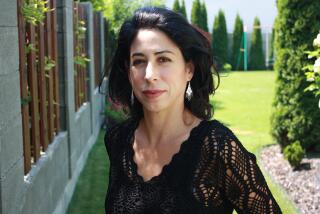The Hand That Rocks the World : NEWS FROM A FOREIGN COUNTRY CAME <i> By Alberto Manguel (Crown/Clarkson Potter: $20; 235 pp.)</i>
The foreign country of Alberto Manguel’s title, taken from a poem by Thomas Traherne, is the world. Its news of war, hunger, oppression and despair circles the picket fires of our domestic tranquility, scouting an opportunity to break in.
We resist the news. The Gulf War, for example, still comes to us like the snapshots Uncle Bill sends back from his trip to Italy. His amiable American bulk, standing, striding, looking thoughtful, impartially blots out the shifting views of Naples and Urbino. Slums or palaces, it’s all Uncle Bill. Or Uncle Norman, in camouflage rig, aware of the camera, and holding up a bottle of Kuwait’s sand.
Manguel’s novel cracks the bottle. What we do is also what we have done. “News from a Foreign Country Came” is about a Frenchman, not an American. But he is, in any case, a digit in the same Western hand that has rocked the world’s cradle for the past few centuries, ruled its waves, built its roads, and allotted its graves.
Manguel begins with a child, Ana. She is 11 or 12, and lives in the silence and solitary perception of someone whose parents are much older, loving but withdrawn, and of sufficient means to keep out the clamoring world. There is a strange oppressiveness in their ponderous seaside house on Quebec’s Gaspe Peninsula, and the world soon gets in, not clamoring but lethal.
Ana’s father, Antoine Berence, is a French army officer, retired from a series of secret missions in Algeria, Argentina and elsewhere but still, reluctantly, in touch with his former associates. He shuns society, spends most of his time in his library. He is passionately devoted to Ana, and aloof at the same time. He takes solicitous care of his wife, Marianne--bloated, pale and silent, and clearly injured in some fashion.
The nature of her injury is one of the mysteries presented at the book’s start. So is the reason for Berence’s angry reclusiveness, more like an exile than a retirement. So is the visit of Monsieur Olive, an old comrade who now works for Canadian Security, and is anxious to enlist Berence’s assistance in identifying the possible target of a terrorist assassination plot. So are the conversations of Rebecca, the family’s Argentine au pair , with two young compatriots who visit her at midnight.
There are two deaths in short order. A playmate of Ana’s accidentally drowns while Rebecca is distracted in conversation with one of her Argentine acquaintances. Shortly thereafter, an explosion destroys part of the house, killing Marianne. We will come to realize that both of these events draw in some sense from Berence’s past; a double nemesis, one oblique and one direct.
What we don’t know, and what propels us through a book that is in part a work of disconcerting moral imagination and in part a rather awkward novel, is what Berence is being punished for. It soon becomes apparent that his military career is involved. But just what part did he play? Who is he, in other words: a tragic personage or an evil one? Because the end, foreshadowed as it partly is, nevertheless comes with such an effect of disabling shock, it is not appropriate to say more here.
In the succeeding three sections, the story moves into the past, shifting from Berence to Marianne. Instead of a silent invalid, she is a vital and hungry young woman. We see her growing up in pre-independence Algiers, the daughter of a colonial administrator. Even as a child, she is drawn to the Algerians despite the paternalistic attitudes of her family and friends.
The atmosphere of Algiers, and of a colonial girlhood--cramped and alluring--is beautifully drawn. Marianne, as an adolescent, seduces an Algerian doctor; she goes on to have other mixed liaisons. Finally, at 32 and facing spinsterhood, she meets Berence. His gentle, educated manner and his interest in Algerian life draw them close. He believes in France’s tutelary role, but he speaks of the fedayeen not as enemies, as his comrades do, but as the “strayed.” There is love in the word; later, this love will appear in a more terrible light.
In the next section, Marianne is married and living in Paris. Berence is away most of the time on military missions of which he says little. She tries to make a life on her own; she gets involved with a theater group and takes up photography. There is a hollowness there, though; the hollowness of Berence’s silence and absence.
In the last section--except for a postscript--they are living in Buenos Aires. Berence is officially retired from the army but he works, through the French embassy, as adviser to the Argentine military. Marianne, still vital and inquiring, makes friends with Argentines of various kinds and classes.
She begins to hear accounts of disappearances and tortures. Rebecca, her maid, has lost much of her family; one relative drowns in a pail of water under questioning. (We think of Ana’s drowned playmate.) Berence, wearied of his job--still unexplained--shows deep contempt for the Argentine military with their crudeness and greed. And then comes the final, appalling revelation.
Manguel is a master at conveying silence and its deadliness. It poisons the Quebec house; it is a pall of oppression over the child Ana. In Paris, it gives a nightmarish unreality to Marianne’s efforts to make a life for herself.
Any number of scenes are far-fetched or awkwardly handled. Manguel is trying to suggest the corruption of the powerful; two parties, one in Quebec and one in Buenos Aires, employ a great deal of forced conversation that tries too nakedly to demonstrate the selfish blindness of the privileged classes.
The portrait of Berence is not altogether coherent, but it is almost more effective on that account. Or, more accurately, Manguel uses such dazzling strokes of black and white in rendering idealism and evil--the evil of corrupting power or of what happens when a man or a society tries to play God with the powerless--that there is bound to be a certain disjointedness.
In the postscript, Berence finally explains himself. It is a shocking monologue. But Manguel is better before he reveals so much. It is in Berence’s early tenderness that the presentiment of horror is best revealed, particularly when we don’t know whether he has come out of the horror or succumbed to it.
Ana, grieved and guilty over her drowned playmate, comes in to be comforted. Berence wants to impart his vision of nature’s order, to tell her that death is a part of it, and that everyone has his time. Instead:
“He took her again in his arms, and lifted her to him and held her, and again rocked her very softly for a long time in silence, as if he, her father, were the immutable center of the universe, and she, his daughter, a small blue moon circling round him, living off his force and reflecting his light.”
It is genuinely moving. Is it also authoritarian and smothering? And what is the cat signaling? We will not know until the end; but here is Manguel’s cat, his image of freedom:
“Antoine Berence was sitting in the armchair with his daughter on his lap when the cat jumped down from her seat, stretched her hind legs, yawned, and very slowly walked to the door, which had been left ajar, and out into the hallway.”
More to Read
Sign up for our Book Club newsletter
Get the latest news, events and more from the Los Angeles Times Book Club, and help us get L.A. reading and talking.
You may occasionally receive promotional content from the Los Angeles Times.









